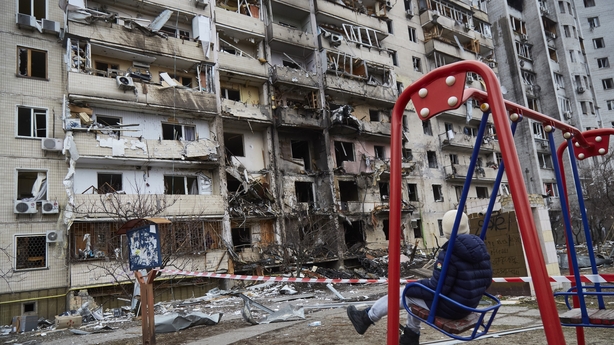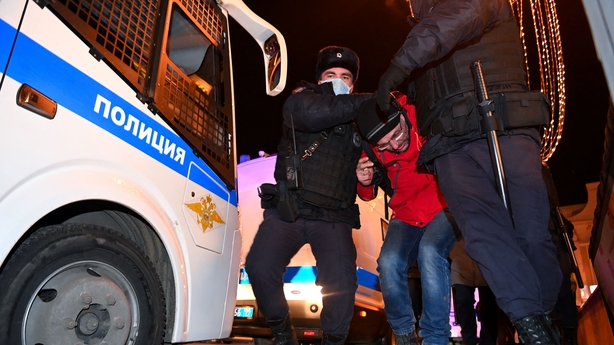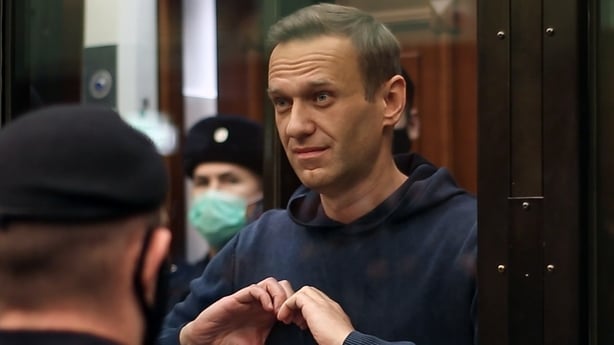"There are decades when nothing happens; and there are weeks when decades happen."
That was the assessment of Lenin in the weeks before the Russian revolution of 1917, and which seems terrifyingly apt for the breakneck speed at which events in Ukraine developed this week.
It had been flagged for some time, with predictions from the US and its allies that an invasion was imminent.
But ongoing diplomatic efforts, and the sheer disbelief that an invasion could take place, allowed many to cling to the hope that the worst outcome could be averted.
When it came in the early hours of Thursday morning it was utterly shocking.
The pictures of explosions in Kyiv, tanks rolling through the streets of Mariupol and young people gathered in underground shelters made it easy to see why EU Foreign Affairs Chief Josep Borrell described these "as among the darkest hours of Europe since the Second World War".

Russian forces came by land, sea and air as the West's most dire warnings were confirmed. The Kremlin spoke of the need to 'denazify' Ukraine as NATO Secretary General Jens Stoltenberg condemned what he called a "deliberate, cold blooded and long planned" act of aggression by Russia.
As sirens rang out over Ukraine and international condemnation rang out also, it was impossible not to feel that all had changed utterly.
The biggest attack by one state against another in Europe since World War II, it has tilted the geopolitical landscape on its axis and left world leaders repeating the question that has preoccupied them for months now - what is going on inside the mind of Russian President Vladimir Putin?
That's just the first of many questions which now need to be answered. Among them, if Russia captures Ukraine, how will it keep it?
Ukraine has shown this week that it fully intends to fight back
Russia might quash any resistance and oust the democratically elected government. Ukraine’s President Volodymyr Zelensky has said he and his family are primary targets of the Russian forces, knowing that Russia installing a pro-Moscow puppet regime is one of scenarios which the West has flagged for some time now.
But, a country of 43 million inhabitants which is the second largest in Europe, Ukraine has shown this week that it fully intends to fight back.
On the first day of the invasion Ukraine's army seemed to stop Russian forces reaching all of their goals, at least slowing the movement of Russian troops. And many Ukrainians are choosing to stay in the country and fight.
As the International Crisis Group points out Moscow faces a "prospectively fierce Ukrainian resistance that it seems to have discounted".
A long-drawn-out military occupation which makes Russia an international pariah may prove as unpopular at home for Vladimir Putin as it does for Ukrainians. Within hours of the invasion, unprecedented scenes of protest were already coming out of Russian cities like Moscow and St Petersburg.

On Thursday night in excess of 1,600 Russians are thought to have been detained as they took to the streets to voice their anger at the invasion. Though the numbers on the streets were small in the overall scheme of the Russian population - thousands out of a population of over 140 million - that they happened at all is significant.
Large scale dissent has become less frequent in recent years as restrictions on those who oppose Vladimir Putin have tightened even further. Some of Mr Putin's most vocal critics have ended up exiled (Mikhail Khodorkovsky), dead (Boris Nemtsov) or imprisoned (Alexei Navalny).
The last major protests across Russia happened last year following the detention of Alexei Navalny. The anti-corruption campaigner had been abroad receiving medical treatment having been poisoned with a nerve agent. The Kremlin denied any involvement in the attempt on Mr Navalny's life, detaining him immediately on his return to Moscow.

The invasion of Ukraine drew criticism from unusually mainstream figures like Ivan Urgant, a Russian comedian who used social media to post a "No To War" message.
He was joined by other Russian TV and sporting names, leaving some analysts to wonder if Mr Putin may have underestimated the reaction at home to his actions in neighbouring Ukraine.
Those are longer term political calibrations though, little use this weekend to those in Ukraine left wondering what tomorrow brings.




